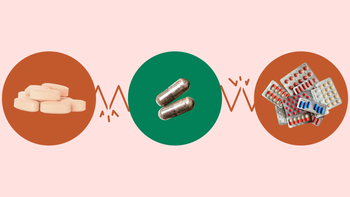
Potassium Chloride vs. Potassium Citrate: What’s the Best Potassium Supplement?
Key takeaways:
Potassium chloride and potassium citrate are both potassium supplements, but they’re not the same. The best potassium supplement depends on the reason you need to take a potassium supplement.
Potassium chloride is used to treat or prevent hypokalemia (low potassium levels).
Potassium citrate is used to treat or prevent certain types of kidney stones.
Access savings on related medications
Table of contents

With many potassium supplements available, it can be difficult to know which one may be best for you. The most commonly used potassium supplements are potassium chloride and potassium citrate. Both of these supplements contain potassium. But they treat very different conditions and can’t be used in place of one another.
Here’s what you need to know about when to choose potassium chloride versus potassium citrate and how to safely take potassium supplements.
First, what is potassium chloride?
Potassium chloride is a type of potassium supplement. You can buy potassium chloride at your local grocery store or retail pharmacy alongside other vitamins and supplements. Potassium chloride supplements are sold as generic supplements and under brand names like Klor-Con M, K-Tab, and Klor-Con.
SHINGRIX (Zoster Vaccine Recombinant, Adjuvanted) is now $0 for almost everyone*
Get SHINGRIX at the pharmacy or in-network doctor’s office today. 98% of privately insured people pay $0 and all Medicare Part D beneficiaries pay $0 at the pharmacy.
Prescribing Information
*Coverage and cost may vary and are subject to change without notice. Reimbursement decisions are made by individual insurance plans.


SHINGRIX is an FDA-approved vaccine for the prevention of shingles (herpes zoster) in adults 50 years and older. SHINGRIX is not used to prevent chickenpox.
• You should not receive SHINGRIX if you are allergic to any of its ingredients or had an allergic reaction to a previous dose of SHINGRIX
• An increased risk of Guillain-Barré syndrome (severe muscle weakness) was observed after vaccination with SHINGRIX
• Fainting can happen after getting injectable vaccines, including SHINGRIX. Precautions should be taken to avoid falling and injury due to fainting
• The most common side effects are pain, redness, and swelling at the injection site, muscle pain, tiredness, headache, shivering, fever, and upset stomach
• SHINGRIX was not studied in pregnant or nursing women. Tell your healthcare provider if you are pregnant, plan to become pregnant, or are breastfeeding
• Vaccination with SHINGRIX may not protect all individuals
• Ask your healthcare provider about the risks and benefits of SHINGRIX. Only a healthcare provider can decide if SHINGRIX is right for you
You are encouraged to report vaccine adverse events to the US Department of Health and Human Services. Visit www.vaers.hhs.gov to file a report, or call 1-800-822-7967.
For US audiences.
Trademarks are property of their respective owners.
©️2024 GSK or licensor.
PMUS-SGXWCNT240015 May 2024
Produced in the USA.
GoodRx Health information and resources are reviewed by our editorial staff with medical and healthcare policy and pricing experience. See our editorial policy for more detail. We also provide access to services offered by GoodRx and our partners when we think these services might be useful to our visitors. We may receive compensation when a user decides to leverage these services, but making them available does not influence the medical content our editorial staff provides.
Potassium chloride supplements are used to treat or prevent hypokalemia, or low potassium levels. People can develop hypokalemia if they have certain health conditions or take certain medications. Hypokalemia often has no symptoms, but it can sometimes cause symptoms like:
Muscle weakness
Muscle twitches and cramps
Excessive thirst
Frequent urination (peeing)
Appetite loss
Nausea or vomiting
Irregular heart rhythm
Confusion
Abdominal swelling
People at risk for hypokalemia need potassium chloride supplements to stay healthy. For them, potassium chloride is more than just a vitamin or supplement — it’s a critical medication.
What are the side effects of potassium chloride supplements?
Common side effects of potassium chloride include:
Nausea and vomiting
Upset stomach
Gas
Diarrhea
Too much potassium chloride can also cause hyperkalemia, or high potassium levels in the blood. Since potassium can cross the placenta, people who are pregnant should check with a healthcare professional if it’s safe for them to take potassium chloride. They can help you weigh the pros and cons.
Read more like this
Explore these related articles, suggested for readers like you.
What are the forms and dosages of potassium chloride supplements?
Potassium chloride comes in:
Immediate-release (IR) forms: Immediate release potassium chloride supplements are available as powder packets (20 mEq) and oral solutions (10%, 20%).
Extended-release (ER) forms: Extended-release (ER) potassium chloride supplements are available as capsules and tablets. Not all extended-release tablets are the same. You can’t switch one tablet brand with another, even though both brands contain potassium chloride.
How should you take potassium chloride supplements?
In general, potassium chloride should be taken by mouth with water or another beverage (e.g., fruit juice). This supplement should also be taken with food to lessen stomach-related side effects.
Here’s a table that breaks down how to take potassium chloride depending on the dosage form.
Dosage form | How to take potassium chloride |
Mix one packet’s contents with 4 oz or about half a glass of water or another beverage. | |
Oral solution (liquid) | Mix the potassium solution with 4 oz or more of water. |
Klor-Con Sprinkle (ER capsules) | Gently pull the capsule apart and mix its contents with some applesauce, pudding, or other soft foods. You can also swallow the capsules whole. |
K-Tabs (ER tablets) | Swallow the whole K-Tab. Don’t crush, chew, or suck on the tablet. |
Klor-Con (ER tablets) | Swallow the whole Klor-Con tablet. Don’t crush, chew, or suck on the tablet. |
Klor-Con M (ER tablets) | Swallow the tablets whole or place Klor-Con M tablets in 4 oz of water and let them dissolve. |
If you have trouble swallowing pills or have questions about dosage forms, talk with a pharmacist. They can help you find the best type of potassium chloride supplement for you.
Ways to save on potassium chloride supplements
There are many ways to save on your potassium chloride medication. GoodRx can help you navigate your options, which may include GoodRx discounts, copay savings cards, and patient assistance programs. You can find potassium chloride prices as low as $9 with a free GoodRx discount.
Now, what is potassium citrate?
Potassium citrate is another type of potassium supplement. You can buy potassium citrate supplements at your local grocery store or retail pharmacy alongside other vitamins and supplements. Potassium citrate supplements are sold as generic supplements and under the brand name Urocit-K.
Potassium citrate supplements are used to treat and prevent certain types of kidney stones. Kidney stones are crystal-like structures that turn into stones in the kidneys. They can be caused by:
Certain health conditions
Genetics
Medications
Potassium citrate is an important medication for people at risk of certain types of kidney stones. For these people, potassium citrate is more than just a vitamin or supplement. It’s a key medication that keeps them healthy.
What are the side effects of potassium citrate supplements?
Common side effects of potassium citrate include:
Nausea and vomiting
Diarrhea
Stomach pain
High doses can increase the risk of developing hyperkalemia and stomach bleeding. Potassium citrate should be taken by people who are pregnant only when it’s medically necessary and as directed by a healthcare professional.
What are the forms and dosages of potassium citrate supplements?
Compared with potassium chloride, potassium citrate doesn’t have as many dosage forms. It’s only available as ER tablets. Potassium citrate has three different strengths:
5 mEq
10 mEq
15 mEq
How should you take potassium citrate supplements?
In general, you’ll take potassium citrate by mouth 2 to 3 times daily with food. Taking potassium citrate with food can lower your risk of developing stomach pain, vomiting, and diarrhea.
When taking potassium citrate, swallow the whole tablet. Don’t crush, chew, or suck on the tablet. Let your healthcare professional know if the tablet is sticking to your throat or if you're having trouble swallowing tablets.
Ways to save on potassium citrate
There are many ways to save on potassium citrate, which is available as both a brand-name and generic medication.
Save with GoodRx. GoodRx can help you save over 76% off the average retail price of the generic version. Generic potassium citrate at certain pharmacies is less than $30 with a free GoodRx discount.
Save with patient assistance programs. If you’re uninsured or underinsured, you may be eligible for potassium citrate patient assistance programs, which offer the medication free of cost.
Potassium chloride vs. potassium citrate
Both potassium supplements have differences and similarities. Let’s take a closer look below.
Differences
As mentioned, potassium chloride and potassium citrate treat different conditions. Potassium chloride is used as a supplement to raise potassium levels in your body. And potassium citrate is used for certain types of kidney stones.
They’re also not available in the same dosage forms. Potassium chloride is available in many dosage forms, including powder packets, liquid, and ER capsules and tablets. Potassium citrate is only available as an ER tablet.
Similarities
Here’s how potassium chloride and potassium citrate are similar:
They have similar side effects. Both medications have stomach-related side effects, such as nausea, diarrhea, and stomach pain.
Both should be taken with food. It’s recommended to take potassium chloride or potassium citrate with food, which might lessen some of the stomach-related effects.
Both medications are available in generic versions. Since both medications are available as generics, this might save you on costs.
How much potassium chloride or potassium citrate can you take per day?
How much potassium chloride or potassium citrate to take will vary depending on each person. The following table provides more information on how much of each medication you can take per day.
Potassium chloride | Potassium citrate | |
Typical starting dose | • Starting dose to prevent low potassium levels: 20 mEq per day | • Very low citrate in your urine: 30 mEq 2 times daily or 20mEq 3 times daily |
Maximum dose | • ER capsules, K-Tabs, Klor-Con M tablets: 100 mEq per day in divided doses with no more than 20 mEq per dose | • 100 mEq per day |
Can you take potassium chloride and potassium citrate supplements together?
No, potassium chloride and potassium citrate aren’t typically taken together.
Even though potassium citrate is used to treat certain types of kidney stones, it can also raise potassium levels. Taking both supplements together increases the risk of developing high potassium levels in the blood (hyperkalemia). Hyperkalemia can be dangerous for your health.
Some people need to take both types of potassium supplements. If this is the case for you, your healthcare professional will monitor your potassium levels using blood tests to make sure you don’t develop hyperkalemia.
The bottom line
Potassium chloride supplements help raise your potassium levels. And potassium citrate supplements are used to prevent certain types of kidney stones. Potassium chloride also has several different dosage forms compared with one potassium citrate preparation.
With so many differences, these medications aren’t interchangeable. If you have questions about these medications, your pharmacist or healthcare professional can help.
Why trust our experts?


References
Advagen Pharma Limited. (2022). Potassium chloride - potassium chloride powder, for solution [package insert].
Advagen Pharma Limited. (2022). Potassium chloride - potassium chloride tablet, film coated, extended release [package insert].
Dr. Reddy’s Laboratories, Inc. (2022). Potassium chloride - potassium chloride solution [package insert].
MedlinePlus. (2015). Potassium.
Mission Pharmacal Company. (2022). Urocit-K - potassium citrate tablet, extended release [package insert].
Remedy Repack Inc. (2022). Potassium chloride - potassium chloride tablet, film coated, extended release [package insert].
Remedy Repack Inc. (2024). Potassium chloride - potassium chloride capsule, coated, extended release [package insert].
ScienceDirect. (n.d.). Search results for potassium chloride.
Upsher-Smith Laboratories, LLC. (2020). Klor-Con M - potassium chloride tablet, extended release [package insert].





























